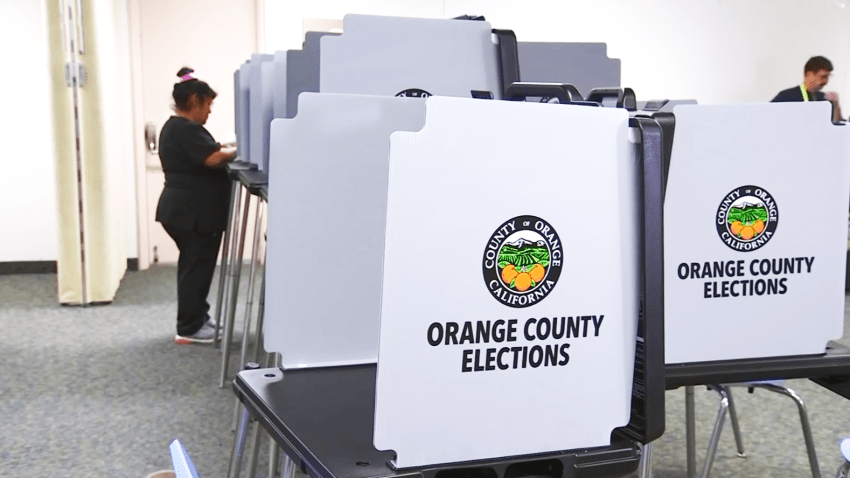New Voting System, New Democratic Edge in Orange County

A woman votes in Orange County on Super Tuesday, March 3, 2020.
Orange County election officials did not see any issues Tuesday with voters casting ballots in a new system, Registrar of Voters Neal Kelley said.
“We have some 20- to 30-minute waits right now around the colleges,” Kelley said Tuesday afternoon. “The rest of the county looks good.”
In-person turnout Tuesday afternoon was at about 53,000, which is on par with 2016 election-day turnout, Kelley said.
Vote-by-mail ballot turnout was running about 40% higher than 2016 in Orange County as of Monday, when Kelley estimated overall turnout could reach about the mid-60s.
Vote-by-mail ballots are 70% higher than 2012, said Kelley.
“Some would say that’s unfair because everybody gets a vote-by-mail ballot now,” Kelley said. “Only 2% of registered voters have voted in person (over the past few days).”
It’s unclear how voter turnout will be affected by a new system in which ballots can be dropped off at 188 centers throughout the county as opposed to precincts, where residents had one place to vote near their home.
Voters may also just fill out their ballot at home and drop it off at a voter center. The Registrar’s website at ocvote.com lists all of the locations, and includes wait times.
Statewide turnout is expected to be about 50%, Kelley said. Orange County might see about 65%, with most of it coming from vote-by-mail.
The new system will also mean faster tabulations of ballots, Kelley said.
Kelley expects to have all of the vote-by-mail ballots cast by 8 p.m. Tuesday.
By 9 p.m., he expects to have the rest of the ballots, including in-person votes on election day, counted.
There won’t be many provisional ballots to count anymore because the precinct system was eliminated, Kelley said. The last batch of ballots to be counted will be the ones dropped in mail boxes on election day, Kelley said.
The Institute for Fair Elections on Monday handed over affidavits from its volunteers claiming more than half of 7,904 voters contacted by the nonprofit were “inaccurate registrants,” that included people who are not citizens, don’t live at the address anymore or have some other issue with their status.
“We are doing much more in Orange County than any other counties,” Kelley said of maintaining accurate voter rolls. “None of this is a surprise. It’s an ongoing thing and every day we have been working on those kinds of things. If they’re looking for a completely clean list that’s not going to happen.”
The heads of Democratic and Republican parties in Orange County felt confident heading in the primary and viewed it as a dry run for the November presidential election.
The big difference for Democrats is the party enjoys a slight advantage of registration, the first time since the Watergate era in the mid-1970s. There were 23,600 more Democrats registered than Republicans as of Monday, Orange County Democratic Party Chairwoman Ada Briceno said.
“Now we’re just working hard to turn out our voters,” Briceno said. “We’re very optimistic, but the truth is we have to make sure we’re changing the hearts and minds of voters going into these vote centers. Change is hard for folks, so we’ve been doing a lot of education.”
The party’s volunteers have gone door to door alerting voters they can cast their ballots at any of the vote centers.
“We’re telling people ‘don’t show up to the school… to your old polling place,'” Briceno said.
Orange County Republican Chairman Fred Whitaker said Democrats may have more voters signed up, but his party has seen about 35,000 more Republicans than Democrats voting so far.
The new voting system makes it easier for party bosses to see who hasn’t voted yet, Whitaker said. Republicans are also happy that there will be fewer provisional ballots, he added.
“I’m always concerned when there’s live ballots out there,” Whitaker said.
“That leaves me with a little uncertainty and a risk for shenanigans, so we’ll have to see how that all plays out.”
Some of the top races observers are watching include two Orange County supervisor races as Republican incumbents Andrew Do, the vice chairman of the board, and Don Wagner, seek re-election in nonpartisan races.
Democratic attorney Ashleigh Aitken is challenging Wagner while Do is facing three Democrats, Westminster City Councilman Sergio Contreras, Garden Grove City Councilwoman Kim Bernice Nguyen and termed-out Santa Ana Mayor Miguel Pulido.
Assemblyman Bill Brough, R-San Juan Capistrano, is fighting for re-election despite losing an endorsement from the Republican Party following accusations from a few women, including Orange County Supervisor Lisa Bartlett, of sexual misconduct. The GOP approved a resolution calling on Brough to retire, but he defied the sentiment and denied the allegations.
Brough is facing off against businessman Scott Rhinehart, Laguna Niguel mayor Laurie Davies, Homeland Security attorney Chris Duncan and Mission Viejo City Councilman Ed Sachs.
Assemblyman Tyler Diep, R-Westminster, is attempting to fend off Diedre Nguyen, A Democratic Garden Grove City Councilwoman, and former Republican state Sen. Janet Nguyen, who lost her bid for re-election two years ago to state Sen. Tom Umberg, D-Santa Ana.
Sen. Ling Ling Chang, R-Diamond Bar, will square off in a rematch with Josh Newman, who was recalled and replaced by Chang, who narrowly lost to him in 2016.
Sen. John Moorlach, R-Costa Mesa, faces a challenge from Democratic Costa Mesa Mayor Katrina Foley, and UC Irvine law professor Dave Min, also a Democrat.
Copyright CNS – City News Service


